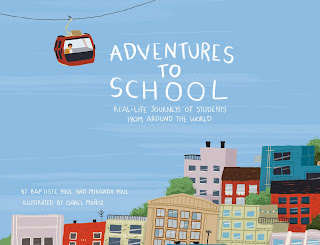I AM FARMER Book Tour Update - Spring 2019
It's hard to believe the time is almost here for the release of this book! But before that happens,
TANTOH needs your urgent help.
On November 15, 2018, Tantoh Nforba Dieudonne went to the U.S. Embassy in Yaoundé, Cameroon to get his travel visa for the tour. The interviewer, without even looking at a single page of the book or his invitation letter, quickly denied his application, without a refund of any fees paid. Without getting much into details, there is much suspicion that the decision (made by a single officer) is largely due to political situations and prejudices within Cameroon that have nothing to do with the book or Tantoh's fulfillment of the requirements.
The GOOD news is that we can all do something to help. In fact, there are many things we can do. This isn't the first time someone in our industry has been held up by our immigration or border patrol (remember when something similar happened to Mem Fox?), but there is much hope that ordinary citizens can get this overturned in Tantoh's case. Please consider taking a few minutes to do one or more of the items on this list. We can turn a negative story into a positive one, so that Tantoh can still travel to the U.S. and inspire tens of thousands of elementary-aged students that, "No matter where you come from, you are never too small or insignificant to contribute to the long-term sustainability of our planet.”
We can't wait to see those smiling faces when Tantoh walks into gyms across America this spring!
Action items:
- Tweet or post on social media your support for Farmer Tantoh, along with the hashtags #IAmFarmer and #GrantHisVisa
- Share this video about Farmer Tantoh with friends and followers, so they may see the great work he is doing to bring clean drinking water to kids and beautiful gardens to the landscape
- Call, email, or write a letter to the U.S. Ambassador to Cameroon, Peter Henry Barlerin (scroll down for contact info and a letter template)
- Call, email, or write a letter to Cameroonian Ambassador, Mr. Henri Étoundi Essomba ((scroll down for contact info and a letter template)
- Call, email, or write a letter to your U.S. Senators and/or Congresspeople (scroll down for contact info and a letter template)
- Contact your local media to cover the story—especially if you live in WI, PA, VA, MD, CT, NY, WV where Tantoh will be speaking at schools in Spring 2019 for the tour
- Reach out to any of your contacts who might be able to help (e.g. immigration lawyers, government leaders, non-profit organization heads, influencers, celebrities)
- Request an advance NetGalley copy of the book I Am Farmer: Growing an Environmental Movement in Cameroon and leave a review on NetGalley and/or Goodreads to show support
- Donate to Save Your Future Association (SYFA)
- Pre-order a copy of the book (although we hope to overturn the decision, we are concerned that if Tantoh isn't able to travel, it could mean a loss of book sales—a percentage of which is slated to support his charity—so your pre-orders mean more now than ever)
- Contact Miranda Paul and Baptiste Paul if you have other ideas to for how to help
Letter Templates and Addresses
(Please feel free to customize or personalize each letter to maximize your impact!)Sample Letter Template to Ambassadors (click to download MS Word file)
Mr. Henri Étoundi Essomba, Ambassador
Embassy of the Republic of Cameroon
3007 Tilden Street NW, Suite 5M
Washington, DC 20008
Phone: (202) 265-8790
Ambassador Peter Henry Barlerin
U.S. Embassy Yaoundé
Avenue Rosa Parks / PO Box 817
Yaounde, Cameroon
Phone: (+237) 22220-1500
Sample Letter Template to Senators/Congresspeople (click to download MS Word file)
To find out who your local representatives are, check out this website.
For more about the book, visit this page.
For news about the current political situation in Northwest Cameroon, here is one overview.
Let's turn this story into a positive one.Thank you for your support! Merci beaucoup!
Sincerely,
Baptiste Paul & Miranda Paul, co-authors











